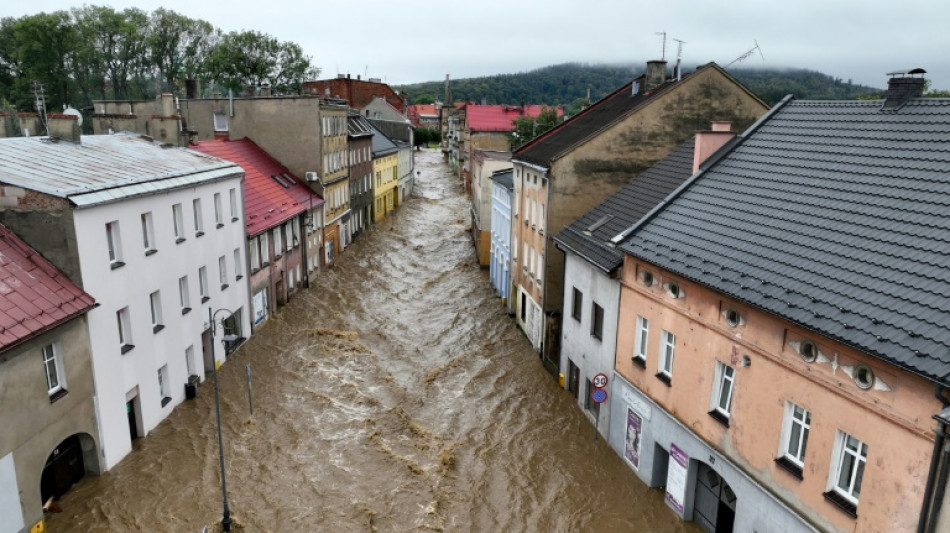
-
 'Star is born': From homeless to Test hero for India's Jaiswal
'Star is born': From homeless to Test hero for India's Jaiswal
-
Verstappen wins fourth consecutive Formula One world title

-
 Survivors, sniffing dogs join anti-mine march at Cambodia's Angkor Wat
Survivors, sniffing dogs join anti-mine march at Cambodia's Angkor Wat
-
Far right eye breakthrough in Romania presidential vote

-
 Jaiswal slams majestic 161 but Australia fight back in Perth
Jaiswal slams majestic 161 but Australia fight back in Perth
-
Edinburgh's alternative tour guides show 'more real' side of city

-
 IPL teams set to splash the cash at 'mega-auction' in Saudi Arabia
IPL teams set to splash the cash at 'mega-auction' in Saudi Arabia
-
Olympics in India a 'dream' facing many hurdles

-
 Wounded Bangladesh protesters receive robotic helping hand
Wounded Bangladesh protesters receive robotic helping hand
-
Majestic Jaiswal 141 not out as India pile pain on Australia

-
 Giannis, Lillard lead Bucks over Hornets as Spurs beat Warriors
Giannis, Lillard lead Bucks over Hornets as Spurs beat Warriors
-
Juan Mata agent slammed as 'cowardly' by angry A-League coach

-
 Marta inspires Orlando Pride to NWSL title
Marta inspires Orlando Pride to NWSL title
-
Palestinian pottery sees revival in war-ravaged Gaza

-
 Main points of the $300 billion climate deal
Main points of the $300 billion climate deal
-
Robertson wants policy change for overseas-based All Blacks

-
 Israel retreat helps rescuers heal from October 7 attack
Israel retreat helps rescuers heal from October 7 attack
-
Afghan women turn to entrepreneurship under Taliban

-
 Mounting economic costs of India's killer smog
Mounting economic costs of India's killer smog
-
At climate talks, painstaking diplomacy and then anger

-
 Uruguayans head to polls with left hoping for comeback
Uruguayans head to polls with left hoping for comeback
-
Trump's mass deportation plan could end up hurting economic growth

-
 Iran director in exile says 'bittersweet' to rep Germany at Oscars
Iran director in exile says 'bittersweet' to rep Germany at Oscars
-
US consumers to bargain hunt in annual 'Black Friday' spree

-
 Cheers, angst as US nuclear plant Three Mile Island to reopen
Cheers, angst as US nuclear plant Three Mile Island to reopen
-
Scientists seek miracle pill to stop methane cow burps

-
 Australia ditches plans to fine tech giants for misinformation
Australia ditches plans to fine tech giants for misinformation
-
Developing nations slam 'paltry' $300 bn climate deal

-
 Red Bulls win 'Hudson River derby' to reach conference final
Red Bulls win 'Hudson River derby' to reach conference final
-
Neuville wins world title after Tanak crashes at Rally Japan

-
 Neuville wins world rally title after Tanak crashes in Japan
Neuville wins world rally title after Tanak crashes in Japan
-
Colapinto cleared for Las Vegas GP despite heavy crash

-
 'Smiling One' Amorim vows he has ruthless streak Man Utd need
'Smiling One' Amorim vows he has ruthless streak Man Utd need
-
Marseille down Lens to stay in touch with Ligue 1 leaders, Lyon draw

-
 New Zealand beat 'proud' Italy in Cane's Test farewell
New Zealand beat 'proud' Italy in Cane's Test farewell
-
Barca collapse in Celta draw without Yamal, Simeone hits milestone

-
 Thailand's Jeeno equals Yin for lead at LPGA Tour Championship
Thailand's Jeeno equals Yin for lead at LPGA Tour Championship
-
New Zealand beat Italy in Cane's Test farewell

-
 Marseille down Lens to stay in touch with Ligue 1 leaders, Lyon held to draw
Marseille down Lens to stay in touch with Ligue 1 leaders, Lyon held to draw
-
Liga leaders Barca suffer late collapse in Celta draw

-
 Retegui fires Atalanta top of Serie A ahead of Inter
Retegui fires Atalanta top of Serie A ahead of Inter
-
Greaves hits maiden Test century as West Indies dominate Bangladesh

-
 Venezuela opposition calls for mass anti-Maduro protest on Dec. 1
Venezuela opposition calls for mass anti-Maduro protest on Dec. 1
-
'Fragile' Man City in uncharted territory, admits Guardiola

-
 Erasmus hails Springbok strength in depth after thrashing Wales
Erasmus hails Springbok strength in depth after thrashing Wales
-
Postecoglou calls for consistent Spurs after Man City rout

-
 'We've never lived this situation' admits Guardiola
'We've never lived this situation' admits Guardiola
-
Lebanon says more than 55 killed in Israeli strikes

-
 'We've never lived this situation' admits Guardiola as Man City lose five in a row
'We've never lived this situation' admits Guardiola as Man City lose five in a row
-
Under-fire Gatland 'motivated' to continue as Wales coach


Hurricanes, storms, typhoons... Is September wetter than usual?
With typhoon Yagi battering Asia, storm Boris drenching parts of Europe, extreme flooding in the Sahel and hurricane Helene racing towards Florida, September so far has been a very wet month.
But while scientists can link some extreme weather events directly to human-caused global warming, it remains too early to draw clear conclusions about this sodden month.
"You will always have some sort of extreme weather events, but their intensity has been magnified by global warming, especially in the context of rainfall," Paulo Ceppi from Imperial College London's Grantham Institute told AFP on Thursday.
"That's probably one of the common drivers of these different events in very different parts of the world."
Early indications from monthly data show some record-breaking precipitation levels in the regions affected.
In central Europe, the torrential rains accompanying storm Boris were "the heaviest ever recorded" in the region, according to the World Weather Attribution (WWA) network of scientists, inundating homes and farmland.
Global warming has doubled the likelihood of severe four-day downpours since the pre-industrial era and the costs of climate change are "accelerating", WWA said in a report published Wednesday.
Meanwhile in Japan's city of Wajima, more than 120 millimetres (4.7 inches) of rainfall per hour from typhoon Yagi was recorded on the morning of September 21 -- the heaviest rain since comparative data became available in 1929.
- Hotter, and wetter? -
"Attributing different weather patterns around the world at the same time to climate change is very challenging," said Liz Stephens, science lead at the Red Cross Red Crescent Climate Centre.
"But the fundamental principle remains that for every 1 degree Celsius of warming the atmosphere can hold seven percent more moisture," she told AFP.
With global warming on track to exceed 1.5 degrees Celsius above pre-industrial times "you can do the math pretty quickly and that will have a measurable impact," said Ceppi from the Grantham Institute.
The 2024 northern summer saw the highest global temperatures ever recorded, beating last year's record, according to the EU's climate monitor Copernicus.
A hotter planet, in other words, could also signal a wetter one.
The sweltering summer in the Mediterranean this year "gives a lot of extra evaporation, pumping more water vapour into Europe if the conditions are right and allowing for all that moisture to be dumped in certain places," Ceppi said.
"The global temperatures -- both over the land and the ocean -- were anomalously high during August-September despite La Nina-like conditions evolving in the Pacific," Roxy Mathew Koll at the Indian Institute of Tropical Meteorology told AFP.
"Anomalously high temperatures assist in supplying additional heat and moisture for storms and weather systems to intensify."
La Nina refers to a naturally-occurring climate phenomenon that cools the ocean surface temperatures in large swathes of the tropical Pacific Ocean, coupled with winds, rains and changes in atmospheric pressure.
In many locations, especially in the tropics, La Nina produces the opposite climate impacts to El Nino, which heats up the surface of the oceans, leading to drought in some parts of the world and triggering heavy downpours elsewhere.
Currently, "neutral" conditions prevail, meaning neither El Nino nor La Nina are present.
Large swaths of South America and Southern Africa suffered from drought in 2024.
The global September update from Copernicus is due early next month and will provide hard data on precipitation levels.
C.Kovalenko--BTB



